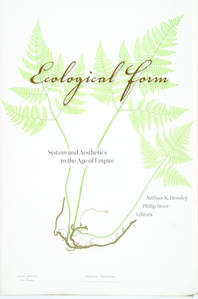This luminous collection, scrupulously edited and beautifully produced, is less invested in cordoning off another subfield than in challenging us to steep Victorian scholarship and pedagogy whole cloth with the concepts and concerns of ecological thinking understood in resolutely global terms.
Daniel Williams, Bard College
Nineteenth-Century Literature
Nineteenth-Century Literature

Ecological Form is about how we might think about the nineteenth century—about how we need to do so—as we come to terms with a damaged and seemingly diminished present. The collection's eleven essays aim to show how one Anthropocene first emerged into visibility in the nineteenth century.
Together these interventions aim to demonstrate the diligence and acuity with which certain Victorian writers experimented with new formal techniques, and generated new models for thinking, in order to comprehend the two massively networked and often violent global systems that organized their experience, and that, we suggest, continue to organize ours: the British Empire and the Industrial Revolution’s carbon economy.
Fordham University Press
Amazon
Together these interventions aim to demonstrate the diligence and acuity with which certain Victorian writers experimented with new formal techniques, and generated new models for thinking, in order to comprehend the two massively networked and often violent global systems that organized their experience, and that, we suggest, continue to organize ours: the British Empire and the Industrial Revolution’s carbon economy.
Fordham University Press
Amazon
Ecological Form would make an excellent primer for those new to the fields of nineteenth-century environmental or postcolonial studies, studies of literature and climate, or Victorian studies more generally. It also proves stimulating reading for those already immersed in these fields and looking to expand a syllabus or engage in areas of recent debate.
Justine Pizzo, University of Southampton
Poetics Today
Poetics Today
The broad range of authors, texts, and concerns analyzed by the contributors impressively showcases the relevance of ecocriticism to Victorian studies. But the collection goes much further than marking out Victorian ecocriticism as a promising subfield. Instead, it performs the leap signaled by the transition from ecocriticism to the environmental humanities: it shows the extent to which ecological issues are entangled with other concerns—not simply because environmental questions can fruitfully be posed alongside other questions, but because they intersect with other lines of inquiry, methodologically and practically.
Ursula Kluwick, University of Bern
Victorian Studies
Victorian Studies